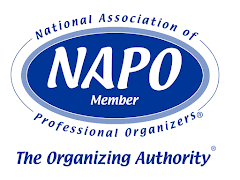Are you tired of being fed up with your clutter and
disorganization?
Do you want to be able to invite people over without having
to do an emergency decluttering (also known as throwing everything into a box
and hiding it somewhere else)?
Sit back and let a professional organizer show you a better
way.
A Professional Organizer
can:
·
Assess
your situation
·
Analyze what
didn’t work
·
Implement
new, sustainable organizing solutions
Being organized reduces your stress, saves you time and money.
Assessing your
situation can include just things as walking through your home or business
and seeing what the spaces look like. Or it can involve looking at your filing
system or computerized systems to see how you function.
Analyzing what didn’t
work means going over the systems that you currently using and any systems
that you have used in the past and figuring out why they are not working for
you. There are numerous ways to do
things and there is no “right or wrong way”. There is “the way that works for
you”.
Implementing new,
sustainable organizing solutions for you. Each person learns differently. Some
people are very visual and need things to be out and displayed or they can’t find
things. Some people can only handle things that have very few steps – or they
won’t do them. Professional Organizers can create new systems that help you become
more organized and more productive. Many systems are too complex and tend to overwhelm
a client. Everyone learns differently and requires different solutions to be
successful. If a system is too complex – even though it’s a great system – most
people won’t follow it for long. Organizing
systems and processes need to work for you. And sometimes it’s a process of
trying a system for a while and then tweaking it over time to make it function
better.
Most people use professionals – whether it’s a doctor,
mechanic, electrician or lawn service – because they don’t have the expertise –
or they don’t have the time or energy to do the job themselves. Or they have tried, sometimes with the help of
family or friends to get themselves organized – but it just didn’t work.
A Professional
Organizer and Productivity Consultant can help you in many ways. If they
belong to NAPO (National Organization of Professional Organizers) they are
bound by a code of ethics and understand that letting a professional organizer
into your home or business is somewhat invasive and a very personal
experience. They are trained to be empathetic
and understanding and never judgmental. A number of organizers also belong to the
Institute for Challenging Disorganization (ICD) and work with clients that have
chronic disorganization and/or hoarding disorder and also have a variety of other
issues such as ADHD, Asperger's, Bipolar, OCD and more. They are also trained to
work with seniors and the aging population, people in life transitions, time
management and productivity; students and more.
Less Clutter = Less Stress SM in your home, your business and your life
Organizational Consulting Services
http://www.organizationalconsultingservices.com
Less Clutter = Less Stress SM in your home, your business and your life
Organizational Consulting Services
http://www.organizationalconsultingservices.com



